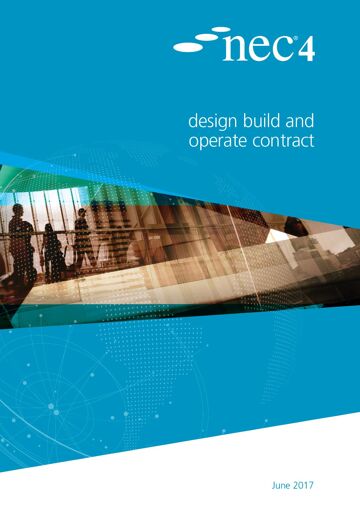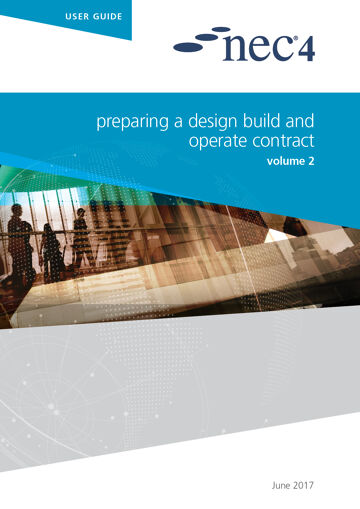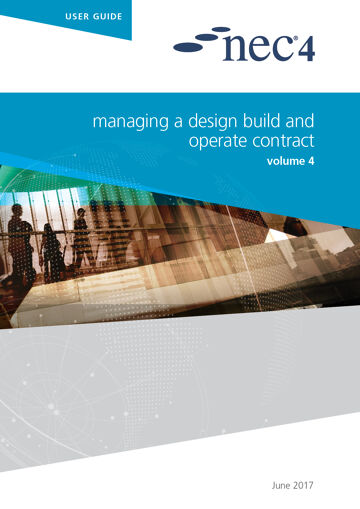Introduction to the NEC4 Design Build and Operate Contract (DBO)
Background
The NEC4 Design Build and Operate Contract (DBO) has been developed for the appointment of a contractor to operate a client’s asset for a period of time, and during that period undertake significant new build or refurbishment to support the operational requirements.
It combines and places responsibility for usually disparate functions (design, construction, operation or maintenance) with a single supplier.
People will be motivated to play their part in collaborative management if it is in their commercial and professional interest to do so. Uncertainty about what is to be done and the corresponding risks and liabilities can lead to disputes and confrontation.
The DBO contract clearly allocates risks, and the collaborative approach will reduce those risks and uncertainty for all the parties.
Why Attend?
Delegates attending this course will gain:
- An insight into when to use this form of contract
- How to put it together, the contract strategy
- How it is managed effectively
This training course starts at 09:00 and finishes at 17:00 with refreshment breaks mid-morning and afternoon, plus lunch. All timings, except the start time, are approximate and may be adjusted to suit natural breaks in the lesson.
Session 1 - Overview of the NEC and the NEC4 Design, Build and Operate Contract (DBOC)
- This session will show how NEC contracts have helped transform industry behaviours and how DBOC works alongside other contracts in the suite.
Session 2 - Using the DBOC
- This session covers the contract strategy; an explanation of the main and secondary Options that can be chosen and the other contract documents that need to be produced. It will also outline the difference between defined and identified terms, their significance in the contract and the contract data and how they should be used.
Session 3 - Managing the contract - the DBOC processes
- 3.1 - General provisions. This session will look at the general techniques that are used to manage the contract including mutual trust and co-operation, communications, the role of the Service Manager and early warnings. It will also outline the difference between defined and identified terms, their significance in the contract and the Contract Data and how they should be used.
- 3.2 - Contractor’s main responsibilities. This session outlines the Contractor’s main responsibilities cover how the works are defined, the Contractor’s design and key people and subcontracting.
- 3.3 - Time. This session looks at when the works start and finish, the importance of the plan and how the Accepted Plan is used and revised to help manage delivery.
- 3.4 - Quality management. This session clarifies how defective work is identified and managed throughout the plan and after Completion.
- 3.5 - Payment. This session covers how amounts for payments are calculated and how handling costs can vary with the main Options. It includes when payments should be made as well as the Schedule of Cost Components.
- 3.6 - Compensation events. This session gives an overview of what compensation events are, how they vary with the Option chosen and how they should be managed to ensure neutral cost to the Contractor and transparency and fairness to the Client.
- 3.7 - Title. This section will review how title passes between the Parties and the relevance of Service Areas.
- 3.8 - Liabilities and insurance. This session looks at the way the contract deals with liabilities and maintains a risk profile which complies with the overarching NEC principle of mutual trust.
- 3.9 - Termination and dispute resolution. This session deals with the process of termination and the reasons why the termination process can be invoked, and also with the various dispute resolution procedures.
Session 4 - Summary and Open Forum
The eLearning follows the same structure as the one day tutor-led course, distilling the key information into approximately two hours of content.
Module 1 - Overview of the NEC4 Suite- This module will show how NEC contracts have helped transform industry behaviours and how the DBOC works alongside other contracts in the suite.
Module 2 - Using the DBOC, the contract strategy
- This module covers the contract strategy; an explanation of the main and secondary Options that can be chosen and the other contract documents that need to be produced.
Module 3 - Managing the contract, the DBOC terms and processes
- This module is broken into nine subsections, each covering one of the key aspects of the DBO contract: General Provisions, the Contractor's main responsibilities, Time, Quality, Payment, Compensation Events, Title, Liabilities and insurance, and Termination and dispute resolution.
Module 4 - Summary
- The final module provides a recap of the course's learning objectives, as well as guidance on possible next steps upon completion of the course and accompanying test.
Duration
Approximately 90-120 minutes.
The length of time taken varies depending on how quickly individuals study and absorb the material.
Please note that the licence is valid for 6 months only from date of purchase.
Successful completion of this course will award you 30 credit points toward your Online Academy qualification.
This course is designed for those working with the DBO form including:
- Project managers
- Contract managers
- Supervisors
- Quantity surveyors
- Clients
- Consultants
- Contractors and their supply chain
It is designed for those with some experience of using NEC, ECC and TSC forms.
Online
Product code: L47508




